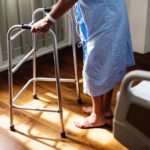Sexual Assault Awareness Month: Sexual Violence and Persons with Disabilities
April is Sexual Assault Awareness Month. Over the last couple of years, thanks to the #MeToo movement, sexual assault has become a major topic of conversation. Survivors are coming forward to not only speak their truth about being assaulted, but hoping this will encourage others to share their stories and challenge a culture of sexual assault. Women and men are now gaining the courage to come forward and even contact attorneys, like this sexual harassment lawyer here in order to get the compensation they deserve from their attackers.
Despite this rise in dialogue about sexual assault, there are still misconceptions about many survivors, especially survivors with disabilities. People with disabilities that experience sexual assault often go unreported. According to the National Crime Victimization Survey, “People with disabilities are victimized by crime at higher rates than the rest of the population”. The term “disability” can include limitations like sensory, cognitive, self-care, and ambulatory or mobility limitations. The types of abuse people living with disabilities face can be different from abuse facing other communities. According to RAINN:
- For elderly people that need daily assistance, they may rely on their caretaker who is abusing them for care. The abuser may use their power to threaten, pressure, or force someone into non-consensual sex or sexual activities.
- Another way for an abuser to control a disabled person is to take away the things they use to communicate (computer or phone).
- People with disabilities may be less likely to be taken seriously when they first report sexual assault or abuse. If the survivor is deaf/hard of hearing or blind/has limited eyesight, reporting the abuse can be even more difficult.
- Some people with disabilities may not understand what is appropriate or inappropriate forms of touching. This can be difficult if a person needs a caretaker to touch them to provide care.
UNFPA found that “children with disabilities are almost four times more likely to become victims of violence than children without disabilities, and nearly three times more likely to be subjected to sexual violence, with girls at the greatest risk.” UNFPA also found that kids who are deaf, blind, autistic, or living with psycho-social or intellectual disabilities are five times more likely to be abused than others. Even though people with disabilities face assault at a rate seven times higher than people without disabilities, about half go unreported.
Last year, around the time of the Brett Kavanaugh Supreme Court confirmation hearing, Legal Council put out a post entitled Sexual Assault in America. By continuing to have these difficult but necessary conversations on sexual abuse, we can challenge the rape culture prominent in the U.S., further education on sexual assault, abuse, and consent, and hopefully decrease the number of sexual assault crimes. If you or someone you know is a victim of sexual assault, please call The National Sexual Assault Hotline at 800.656.HOPE (4673).


